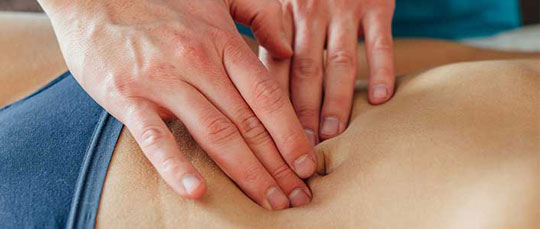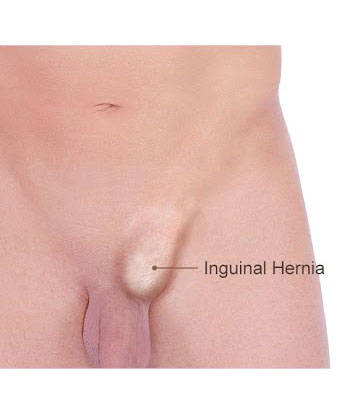Laparoscopic Hernia
What is Hernia?
When an organ or fatty tissue pushes through an abnormal opening in the abdominal muscles it is called hernia. As we know, the abdominal wall is made of various layers and weak spots may allow the internal contents to herniate. Bulging can occur in the upper thigh, belly button, groin areas.

Causes/ Risk Factors:
Depending upon the various types of Hernia, It may be congenital or may develop with the development of muscles. The most common reason is the weakness in abdominal wall as increasing the pressure may cause stress, strain, and bulge through the weak points. There are following risk factors involved:-

- Genetics:- This kind of Hernia run in the family only due to underlying tissue problems. These people have less of Type 1 Collagen which is mature and stronger and more of Type III collagen which is immature, weaker ,hence at high risk of developing hernias
- Gender:- Men are assumed to be at greater risk of an inguinal hernia due to natural weakness in the inner groin.
- Inguinal Hernia:- Men are assumed to be at greater risk of an inguinal hernia due to natural weakness in the inner groin.
- Unhealthy Diet:- Low fiber diet may cause constipation which creates strain in bowel movements and pressure in the abdomen. Constipation is assumed to be the number 1 factor responsible for Creating hernia gradually.
- Obesity:- Gaining weight continuously may increase the risk of herniation.
- Chronic Cough and Sneezing:- Pressure raised through a cough can have the greater impact than lifting heavy weight. There are great chances of a hernia to the patients bearing cough, bronchitis, asthma, COPD, acid reflux, postnatal drips etc.
- Tobacco / Smoking:- Consuming Tobacco directly or through smoking will cause a cough due to the involvement of nicotine which affects the blood flow in small vessels. No early impacts can be seen, smoking affects the people slowly.pregnancy.
- Pregnancy & Labour:- We all know the tendency of labor pain which causes ultimate pressure in the abdomen. In case of a hernia, a bulge may be noticed during
- Sleep Apnea:- The actual factors are unrecognized but poor oxygenation, unhealthy tissues, snoring pressures increase risk of hernia.
- Enlarged Prostate:- Visible signs are the slow urinary stream, frequent urination at night, incomplete bladder emptying in men may result in pressure and hernia thereof.
- Straining to Urinate:- Women suffering from prolapsed bladder or cystocele may have straining problem while urinating.
- Surgery:- People who have gone through the pelvis or abdominal surgery may be at risk of a hernia due to an incision. the responsible factors are the infection, unhealed wound, emergency surgery case, and other surgical effects.
- Steroids, Immune Suppression or Chemotherapy:- Mentioned medicines reduce healing potential resulting in weakening of prior incisions and increased risk of developing the hernia.
- Ascites:- Patients with liver failure may suffer from a hernia
- Diabetes:- Diabetic patients gone through the pelvic or abdominal surgery may face healing problems of muscle & fascia layers and resulting in an incisional hernia.
Most commonly, Hernia is the result of muscle weakness or fascia. Excess pressure may push the organs or tissue to come out through the weak spots opening. Exercising is the good option to protect a hernia as it strengthens the abdominal muscles and pelvic tissues. Performing Yoga, cycling, running, hiking, treadmill, sit-ups, pull-ups, weight lifting, pilates etc are fumed good for healthy muscles.
Symptoms:-
Two common symptoms are found in patients which may vary accordingly:-
- Buldge:- It increases while standing and reduces while lying down
- Pain:- It may affect the groin, upper leg, upper inner thigh, bound the back, vagina or scrotum, belly button depending upon the type of a hernia. A hernia-related pain may be sharp, dull, aching, tingling, constant, intermittent and come & go type.
Common Types of Hernia?
The most common types of Hernia are Inguinal Hernia, Femoral, Obturator, Abdominal Wall Hernia, Diastasis Recti. We will here study the all types of Hernias in details:-
- Inguinal hernia:- It occurs in Inner Groin when a bladder/ intestine expands through the abdominal wall/ inguinal canal or bowel extracts through lower abdomen into the groin. Especially men suffer through this due to natural weakness in this area. Sometimes after the birth, the canal doesn’t close properly and leaves a weakened area which leads to hernias. 80% hernia problems are related to inguinal only.
- Femoral Hernia:- It happens when bowel enters the canal carrying the femoral artery into the upper thigh or fatty tissue pushed through into groin at inner top thigh. Women, especially who are pregnant and obese, are most affected through a femoral hernia.
- Obturator Hernia:- This is the part of pelvic floor hernia which usually occurs in women who have gone through the multiple pregnancies and who have lost significant weight by the time. This occurs through the obturator canal.
- Abdominal Wall Hernia:-
- Ventral:- the phrase is used for abdominal wall related hernias, not for the groin
- Umbilical Hernia:- It occurs in belly button when part of small bowel pushes through the abdominal wall close to navel or belly button. It commonly affects to newborn babies or the women who are having many children or are obese.
- Epigastric Hernia:- It occurs when organs or fatty tissue extracts through abdomen between the belly button and breastbone. It happens to infants because of abdominal wall weakness. Although this can be evident in later life (adult life) when bulge becomes visible in the upper abdomen.
- Spigelian: It occurs when intestine pushed through your abdomen by stomach muscle below the belly button. it occurs outside edges of rectus abdomen muscle and it is rarely found. This can be recognized when pain occurred or bowel is stuck in it.
- Flank/ Back: Petit or Grynfeitt comes used this kind of a hernia.
- Incisional Hernia: It occurs to the people who have gone through abdominal surgery before or who were inactive after the surgery. It happens when tissue pushes through the surgical injury which was not healed completely. This commonly happens to overweight & aged people.
- Diastasis Recti:- It is different from an epigastric hernia. it results from the weakness in the membrane where two rectus abdominus muscles from the right and left come together and creates a bulge in the midline.
laparoscopic Hernia Repair Surgery in Gurgaon
Laparoscopic Hernia at Dr. Vaibhav Kapoor Rated 4.8/5 based on 372 customer reviews
